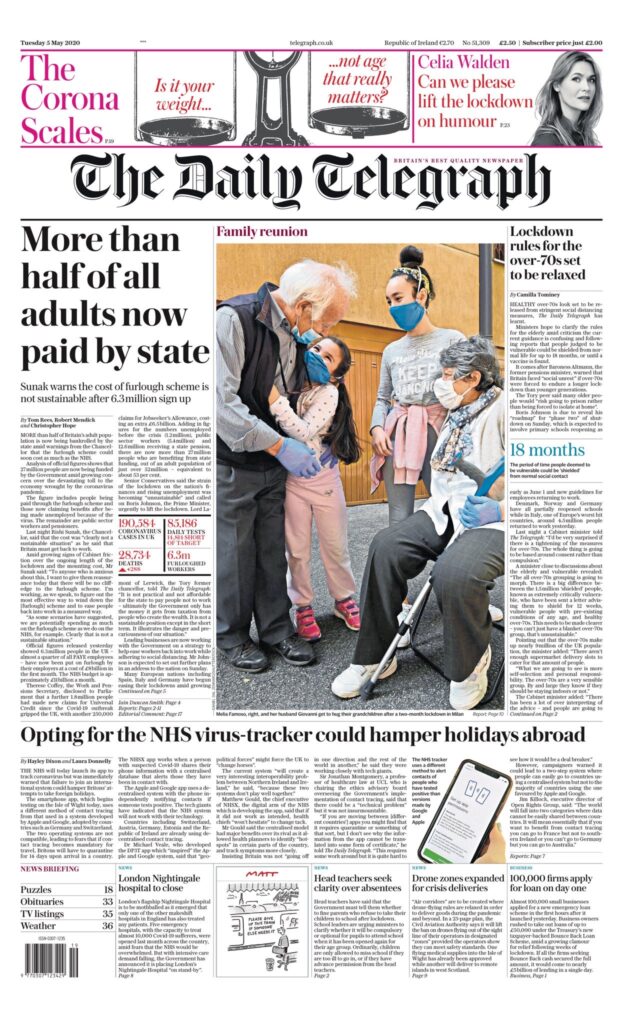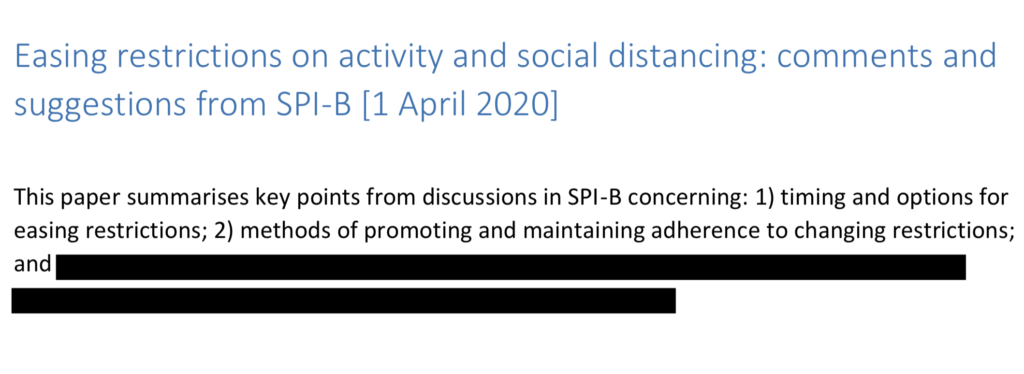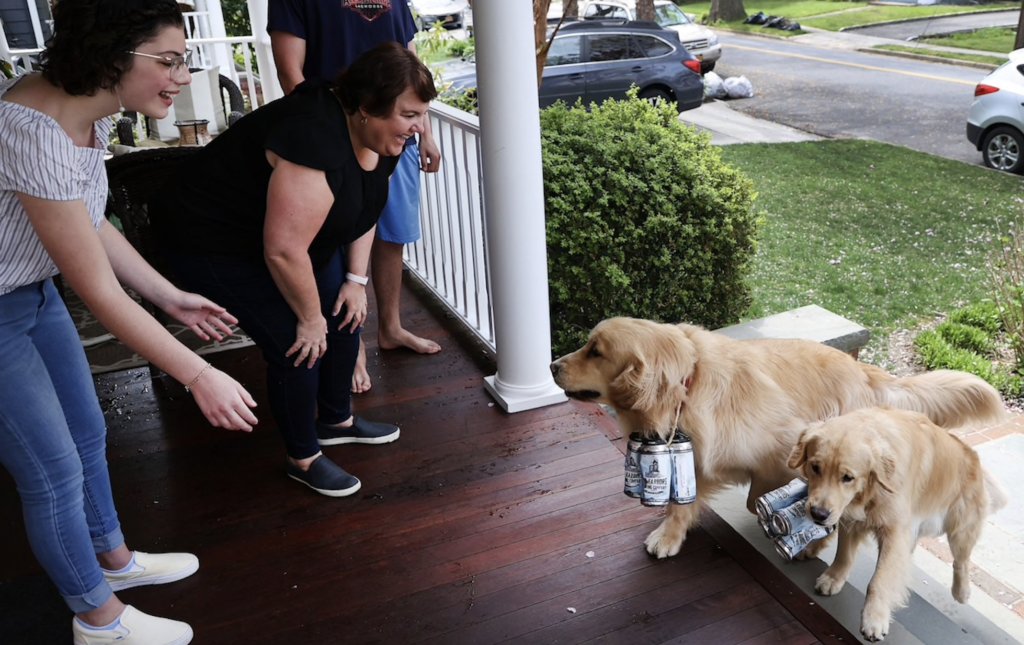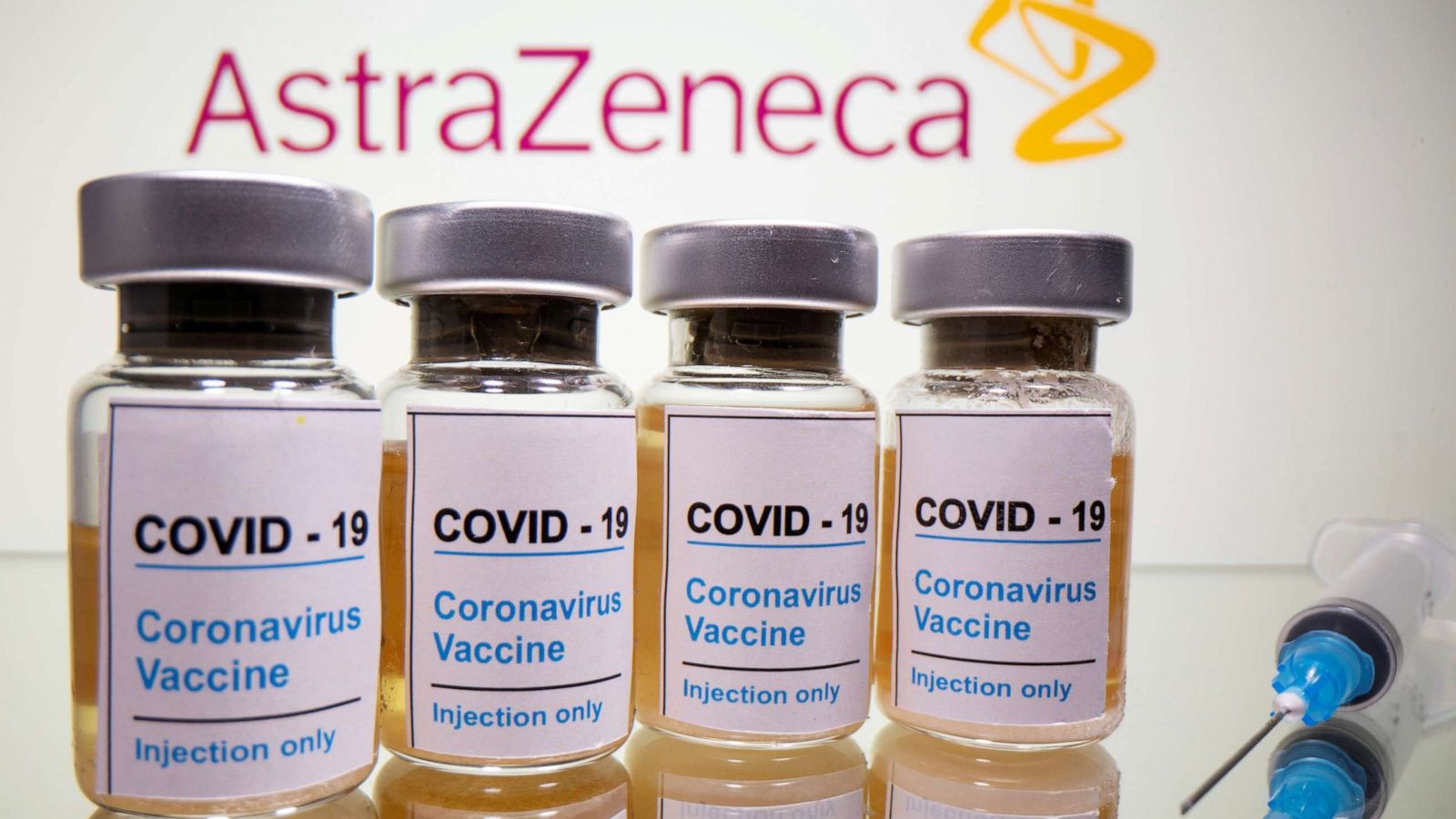
The Telegraph warns that people using the NHS’s new coronavirus-tracing app may not be able to travel to other countries. Failing to use the system developed by Apple and Google, which is being used by Germany, Switzerland, Austria and Estonia, among other countries, could mean Britons have to remain in quarantine for 14 days on arrival in another country. The paper posts out that this could result in the Covid equivalent of a hard border between Northern Ireland the Republic of Ireland because the latter is using the Apple-Google app. The system developed by Apple and Google relies on a decentralised system with users’ phones independently notifying them if they’ve been in contact with others who’ve tested positive, whereas the NHS app transmits users’ information to a centralised, Government-owned database that other countries won’t have access to – at least, not without signing an agreement with the UK authorities that enables them to get around EU-wide GDPR rules. But the Telegraph doesn’t explain why anyone wanting to travel abroad couldn’t simply download the Apple-Google app.
Kieren McCarthy has written a scathing article in the Register today saying the NHS app won’t work on iPhones unless the phones are awake and the app is open. He also flags up that the app may be a “battery hog”, which means people aren’t likely to keep it open. A similar home-grown app in Australia has run up against exactly those problems, as you can see in this YouTube video. McCarthy thinks it’s only a matter of time before the Government is forced to do an embarrassing u-turn.
The Times reports that Conservative MPs accused trade unions of “political sabotage” yesterday after they rejected the Government’s yet-to-be-announced plans for getting people back to work. Frances O’Grady, leader of the TUC, said there were “huge gaps” over protective equipment and testing. She called for “robust direction and enforcement” so employers can “do the right thing”. Ed Miliband, the former Labour leader and shadow business secretary, supported the unions. Current leader Keir Starmer, writing in the Times, was more muted, calling for a “national consensus” about when and how to end the lockdown. Disappointingly, he criticises the Government for being “too slow to enter lockdown” and says he would support another extension on Thursday. Meanwhile, Nicola Sturgeon says Scotland should be prepared for a further three weeks of virtual house arrest. She’s expected to unveil an exit plan on Thursday. The total number of deaths in Scotland, as of yesterday, was 1,576.
The ONS released its latest weekly data on registered deaths in England and Wales at 9.30am this morning, as it does every Tuesday. For the week ending April 24th (Week 17), 21,997 deaths “involving COVID-19” were registered, a decrease of 354 compared to the previous week. That’s the first decrease in the number of deaths since the week ending March 20th (Week 12) and 11,539 more than the five-year average for Week 17. Of the 21,997 deaths in Week 17, 8,237 mentioned “novel coronavirus (COVID-19)”, which is 37.4% of all deaths. That’s a decrease of 521 deaths compared with Week 16, when Covid deaths were 39.2% of the total.
The total number of deaths “involving COVID-19” in England and Wales for the year to date up (December 28th 2019 to April 24th 2020) is 27,365 – and it climbs to 28,272 if you add those deaths that occurred on or before April 24th but were registered between then and May 2nd. According to Reuters, the year-to-date total climbs above 32,000 if you add deaths in Scotland and Northern Ireland up to May 2nd, meaning the UK now has the highest Covid death toll in Europe – and no doubt that figure will dominate tomorrow’s front pages. But we should caveat this by noting that the ONS’s definition of deaths “involving COVID-19” is broader than the definition of deaths from COVID-19 that’s used by the Department for Health and Social Care (DHSC) and released by the Government each day. The DHSC data for England and Wales now includes deaths in the community, nut just in hospitals, but the DHSC only includes those deaths where the person in question tested positive for the virus.
A freelance journalist called Ronan Maher has written a fascinating thread on Twitter about changes to the rules for recording deaths and certifying cremations that were made by the Coronavirus Act at the end of March. It’s a detailed analysis, but the gist of it is that the safeguarding rules put in place after the prosecution of Dr Harold Shipman, Britain’s most prolific serial killer who covered up his tracks by signing the death certificates of his victims, have now been suspended. Maher concludes: “These changes create the potential opportunity for medical malpractice; indeed, people might attempt to get away with things that they would not have otherwise. Remember, the safeguards were not there for nothing.”
The ONS says that 33,593 more people than average died of all causes in the year to April 24th in England and Wales, only 27,365 of which involved COVID-19. But that doesn’t necessarily mean the true figure for Covid deaths is higher. That’s not only because the 27,365 figure is likely to include people who didn’t actually die of COVID-19, even though it’s mentioned on the death certificate. It’s also because the all-cause mortality excess death figure includes people who died as a result of measures put in place by the Government, such as those who’ve died because they haven’t been admitted to hospital with other diseases. As I flagged up a few days ago, Hector Drummond has a good piece in the Critic in which he analyses the ONS’s excess death data and concludes that not all of the non-Covid excess deaths that have occurred this year can be due to COVID-19 because if they were you’d expect the ratio of men to women among those deaths to be 60:40 when in fact it’s 50:50.
Tom Chivers looks at excess deaths, among other things, to try and work out if the lockdown is killing more people than it’s saving in a Radio 4 documentary that was broadcast today at 11.30am. He summarises the contents of the programme in UnHerd, concluding that it’s impossible to answer the question he’s posed with any degree of certainty but precisely because of that “the lockdown is probably worth it”. That’s an argument I’ve heard a lot, but I’m not persuaded. After all, the uncertainty applies to both sides of the ledger – the number of people that would have died of COVID-19 if we hadn’t gone into lockdown but had stuck with mitigation, and the number of non-Covid deaths there have been as a result of the lockdown, as well as those in the future. In a paper for the Macro Strategy Partnership, a company that does research on global markets, one of the partners has crunched the numbers and concluded that “the costs of lockdown, in terms of human lives, may be not one but two orders of magnitude higher than the ‘cost’ of the disease”. And a couple of Fellows of the Actuarial Society of South Africa have done a similar calculation and concluded that the lockdown will lead to 29 times more lives lost than the deaths it seeks to prevent. So why does Chivers think the number of lives the UK lockdown has saved is probably greater than the number it has killed and will kill? To be fair to him, perhaps he explains that in the documentary which I haven’t listened to yet.
As I noted yesterday, the ONS is collaborating with various government departments, including the Actuary’s Department, to try and calculate the number of deaths indirectly caused by the virus, which will include those who’ve died as a result of the lockdown. I discuss some of these issue in my forthcoming Spectator column.
I’ve written an op ed for today’s Sun arguing that the Government should reopen primary schools ASAP. The arguments will be very familiar to readers of this site, but here’s an extract:
Some will worry that if we send our children back to school too soon, they will risk catching coronavirus. In fact, it poses almost no threat to children. As of April 30, only seven people under 20 had died of Covid-19 in hospitals in England and three of them had underlying health conditions. Only one child under the age of ten has succumbed to the virus.
Nor is there a risk that they will infect others, such as their teachers, parents and grandparents. Research published last week by the Royal College of Paediatrics and Child Health found that children under the age of ten do not transmit the virus. And that isn’t just true of the UK. A joint commission by China and the World Health Organisation hasn’t found a single case of a child under ten infecting an adult anywhere in the world.
The Government has published a cache of documents produced by the Scientific Advisory Group for Emergencies (SAGE), although they’ve been heavily redacted. I haven’t had time to go through them all yet, and I’d be grateful if any readers want to do that and alert me to anything of interest. But just a cursory glance reveals some interesting things. In a paper dated March 17th-18th, SAGE discussed whether to lockdown London, something that was considered and rejected by the Government. Perhaps not surprising Boris rejected this option, given that the paper says the social distancing measures announced on March 16th appear to have been effective. It notes that use of public transport in London has fallen by 40% and refers to a YouGov survey showing that 45% of Londoners have stopped visiting leisure venues, 30% have stopped seeing friends, 27% have stopped seeing family, 16% have stopped sending school age children to school and 13% have stopped going to work.
What happened after this to change the Government’s mind, given that this advice was published after Imperial College published its notorious March 16th paper? Perhaps it was the advice contained in a SAGE paper dated March 20th in which the advisory group says: “It is very likely that we will see ICU capacity in London breached by the end of the month, even if additional measures are put in place today.” As we know, additional measures were put in place two days later, but ICU capacity was not breached, either in London or elsewhere. To underline this point, it’s just been announced that the flagship Nightingale Hospital built in the ExCeL centre has now been mothballed. The Telegraph has more.
One thing that jumped out at me when reading these advisory papers is how political much of the advice is, containing judgments about how public announcements are likely to be received, what the Government should avoid doing if public confidence is to be maintained, etc. For instance, in a paper dated April 13th, SAGE highlights the risks associated with antibody testing, one of which is that employers might discriminate against people who are antibody negative. Another is that “commercial organisations” might start doing antibody tests. (God forbid!) This is very far from being merely scientific advice and some of the more overtly political stuff has clearly been relayed via a subgroup called the Scientific Pandemic Influenza group on Behaviour and Communications, or “SPI-B” to use its code name. The members of this group, who were revealed yesterday, aren’t all scientists, at least not in the commonly understood sense of the term, so their advice can’t really be called “scientific”. In a paper dated March 14th, the members are described as “academic specialists in Health Psychology, Social Psychology, Anthropology and History.” Given that left-of-centre academics in the social sciences and the humanities outnumber right-of-centre academics by a ratio of at least 10:1, what’s the betting that several members of this group turn out to be hard left supporters of Jeremy Corbyn? (If any reader wants to go through the list of SPI-B members and see what their political affiliations are, I’d be grateful.) Some of the reports produced by SPI-B are heavily redacted (see below), but on the plus side the anti-Tory activists on the subgroup can probably be relied upon to leak anything they think is likely to embarrass the Government.

There a good letter in today’s Telegraph about the Government’s over-reliance on the Imperial College model:
SIR – The Government is basing policy on Professor Neil Ferguson’s modelling, which assumes exponential growth if a disease is left unchecked. Though cases have increased, exponential growth has not occurred.
The Nobel laureate Professor Michael Levitt and Professor John PA Ioannidis, both of Stanford University, argue that Professor Ferguson’s calculations may be out by a factor of 10, and other experts have said that an increase in numbers slowed before lockdown could have had an effect.
Minutes of the meetings of the Scientific Advisory Group for Emergencies (SAGE) should be released so that the conversation can be more open. Currently, we are all told to accept lockdown and there is no debate. One group’s opinions should not be blindly accepted. If Professor Ioannidis and Professor Levitt are wrong, we need to be told why.
Paul Sanderson, FRCS, Hexham, Northumberland
An American reader has flagged up some interesting data from the Transport Security Administration (TSA). The TSA, which is responsible for US airport security, employs slightly more than 54,000 people, about 25,000 of whom are customer facing. Of these, 516 have tested positive for COVID-19 and of those five have died. That suggests airports, and air travel, aren’t transmission hot spots, something Jonathan Kay also concluded in his Quillette article about Covid super spreaders. Incidentally, Quillette published an excellent account of what it’s like to work for the TSA by a long-standing employee last year.
Amusing anecdote about prison offers sent by one reader:
Next door neighbour’s son is a prison officer in the East Midlands. Turns out the screws there have been reprimanded because some of them have been getting haircuts from the lags, presumably in return for certain other considerations. Apparently, it’s screamingly obvious who the customers are since after several weeks of lockdown it was starting to look like a hippy convention.
Nigel Farage received a visit from the police yesterday after traveling to Dover to make a video about illegal immigrants. He complained about it last night, tweeting: “Lockdown lunacy. Two police officers just knocked on my door to advise me on essential travel. They had received a complaint that I had been to Dover to report on the illegal migrant scandal taking place. What a total waste of time and money.” Hard to disagree. The Standard has more.
Christopher Snowdon did a bang up job of making the case for ending the lockdown on Sky News yesterday that you can watch here. He looks a bit bored in his house on Shoreham-on-Sea, where he’s been holed up for six weeks, but I know something that will cheer him up – beer-delivery dogs. Six Habors Brewery of Huntingdon New York has enlisted the help of two golden retrievers called Buddy and Barley to help deliver beer to their customers. Will Oddbins in Shoreham-on-Sea follow suit? The Telegraph has more.

A quick round-up of interesting articles I’ve spotted, or which readers have flagged up, in the last 24 hours:
- ‘It’s time to set ourselves free‘ – Good polemic by Peter Loyd for Conservative Woman. Title says it all
- ‘How A.I. Steered Doctors Toward a Possible Coronavirus Treatment‘ – New York Times article about how an intelligent machine has identified a drug to treat coronavirus called baricitinib
- ‘Capitalist countries have the highest levels of Covid-19 safety‘ – Interesting article by Rainer Zitelmann in CapX pointing out that the more free a country is economically, the higher its safety ranking as far as protecting its citizens against the virus is concerned
- ‘Sweden tames its “R number” without lockdown‘ – Excellent blog post in the Spectator by Fraser Nelson observing that Sweden has succeeded in squashing the sombrero without placing its citizens under house arrest
- Matt Hancock on TalkRadio – Julia Hartley-Brewer put Matt Hancock on the spot this morning, asking, among other things, why the death toll in Sweden is less than 3,000, given that the ICL model predicted it would be 40,000 by 1st May if it stuck with mitigation, a point Fraser makes in his piece
- ‘Can we save lives and preserve our quality of life at the same time?‘ – Good essay in the Strategist by Ramesh Thakur, a former UN Assistant Secretary-General, summarising the case against lockdowns
- ‘Nearly All Patients Hospitalized With Covid-19 Had Chronic Health Issues, Study Finds‘ – Article in the New York Times telling us something we already know, but with lots of hard data to back it up
- ‘Individual preventive social distancing during an epidemic may have negative population-level outcomes‘ – New paper published by the Royal Society arguing that social distancing may end up costing more lives than it saves
- ‘Is the “second wave” threat a myth?‘ – Provocative article by Will Jones in Conservative Woman
- ‘The “new normal” may be even worse than lockdown‘ – Pessimistic piece by Benedict Spence in the Telegraph looking at the absurdly complex social distancing rules we’ll be expected to observe when the lockdown is “lifted”
- ‘Individual variation in susceptibility or exposure to SARS-CoV-2 lowers the herd immunity threshold‘ – Very interesting preprint arguing that countries can achieve herd immunity after ~20% of the population has been infected, rather than 60 – 70%. This is due to the variability in the susceptibility of different subpopulations to infection
- ‘The Worldwide Lockdown May Be the Greatest Mistake in History‘ – Dennis Prager of Prager U lets rip on RealClear Politics
More suggestions for potential theme tunes for this site have been sent in by readers: ‘Twenty Yards Behind‘ by Dr Feelgood, ‘It’s the End of the World as We Know It‘ by REM, ‘We’re Not Gonna Take It‘ by Twisted Sister, ‘In the Land of the Pig, the Butcher is King‘ by Meatloaf, ‘Please Release Me‘ by Englebert Humperdink, ‘I Want to Break Free‘ by Queen and ‘Something Better Change‘ by The Stranglers. As several of you have pointed out, David Greenfield, the Stranglers’ keyboard player, died yesterday – although he died of COVID-19, so he may not have approved of that song being included here!
Thanks as always to those who made a donation to pay for the upkeep of this site yesterday. If you feel like donating, you can do so by clicking here. (Every little helps!) And if you want to flag up any stories or links I should include in tomorrow’s update, you can email me here. I’ve added a new page, detailing the legal challenges against lockdowns around the world, here. No doubt I’ll be adding to that list.
Apologies that the daily update was late today. Will try to do better tomorrow.











Profanity and abuse will be removed and may lead to a permanent ban.